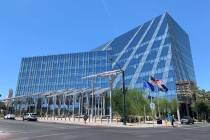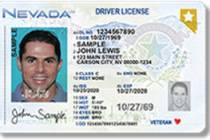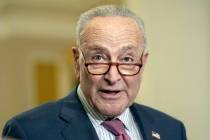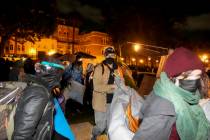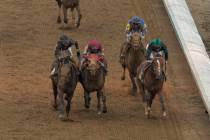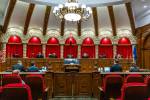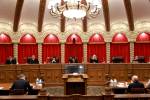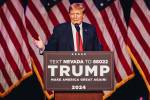‘Heavy donors’ behind initiatives
Conservative activists are hoping to get two initiatives on the November ballot that they say would clean up government contracting and limit government overreach.
One of the ballot measures seeks to ensure government contracts aren't being doled out in exchange for political donations. Another would prevent taxpayer dollars from being spent on lobbyists.
"Both of these are dear to my taxpayer heart," said Kris Munn, a Republican activist and former Assembly candidate. "I've always been a small government type of person," and that's the aim of these initiatives, he said.
Munn is listed as the chairman of the ballot advocacy group, Nevadans for Clean and Open Government, that supports both initiatives.
Both are initiatives to amend the Nevada Constitution. The Clean and Open Government Amendment would make it a crime for anyone receiving a sole-source government contract -- one that isn't subject to open bidding -- to contribute to candidates or political parties until two years after the end of the contract.
The Tax Backed Lobbying Ban would bar public entities from using tax revenue to pay for lobbyists, a practice that opponents say fuels big government by giving governments a way to try to squeeze more money out of elected officials.
Munn said the initiatives weren't his idea, but he agreed to be their public face when the backers, whom he would not name, asked him.
The measures are backed by "some heavy donors" from in and out of state, he said, but the backers won't become known until required financial disclosures are filed in the coming months. Munn said they are not trying to be secretive but don't want to give fodder to the opposition if they don't have to.
And there is opposition. Nevadans for Nevada, a group backed by the state AFL-CIO, filed suit against both initiatives in Carson City last week.
The two lawsuits claim that each initiative violates the rule that ballot questions address only one subject, misleads petition signers in the way it is described, and is likely to be found unconstitutional if enacted.
State AFL-CIO Secretary-Treasurer Danny Thompson said the initiatives aren't what they seem. They're really anti-union measures in disguise, he contended.
Thompson said the lobbying ban contains a provision that would prohibit "dues checkoff," the practice of letting unions take workers' dues out of their paychecks automatically rather than billing them individually.
Not allowing the practice creates unnecessary obstacles for unions, he said.
The contracting initiative, is really a backdoor attempt to enact "paycheck protection," or a ban on allowing unions to engage in political activity, Thompson said. That hidden provision is in the full initiative language but not in the brief description that people would see when they signed the petition.
"'Sole source contract' is defined to include collective bargaining agreements, but it doesn't say that in the description," he said. "Clearly, the people promoting this thing are trying to deceive people. The reality of what this does is it stops firefighters, police officers, teachers and public employees from participating in Nevada's political system."
The contracting restrictions also would affect businesses that do specialized work for governments, which are often in fields where there isn't enough local competition to hold a bidding process, such as legal work in a particular area or information technology functions.
The effect would hurt local business, possibly causing state business to go to out-of-state companies instead, Thompson said.
Munn, who ran as a Republican for two different Assembly seats in 2004 and 2006, denied that hindering unions was the objective of either initiative.
"A couple of different people are going to feel threatened" by the initiatives, he said. "That's not what this is about. We're not going after unions in particular."
The contracting initiative is intended to avoid the appearance that elected officials are directing state funds to reward their political donors, Munn said. It applies to all contracts over $100,000 that are awarded by a government entity without being open to competition.
"If they're donating to the elected members of whatever body is going to contract with them, there's a conflict of interest there, and they ought to open up the process," Munn said. "I'm not saying it's a bribe. I respect elected officials. But it can affect decision making, and it creates an appearance" of shady dealings.
In the case of the lobbyist ban, he said, it isn't right that governments should seek to advance their agendas through lobbying rather than through seeking public support. The public should set government's agenda.
When governments have lobbyists, he said, they tend to try to get more money out of other governments, and the public sector balloons as a result, often with programs and monies that were never vetted by voters.
"I want my tax dollars to go for an agency to do what that agency is supposed to be doing, not for that agency to go get more money somewhere else," he said. "Some say it's like robbing Peter to pay Peter."
Munn says he is not planning to run for office this year. In the past, he supported the gubernatorial primary campaign of state Sen. Bob Beers, R-Las Vegas, and the TASC, or Tax And Spending Control, initiative, which was thrown off the ballot by judges.
Also involved in the two initiatives is Jonathan Hansen, a lawyer and member of the family that founded the Independent American Party. He is listed as the ballot advocacy group's resident agent. In the past, family members have backed failed initiatives to keep public employees from serving in elected office and to roll back taxes.
The two current initiatives will have paid workers start gathering signatures this week, Munn said.
Lawyers for the initiatives weren't available to discuss the legal challenge last week. Munn said they will be preparing a response to the lawsuits.
Munn said he was confident both initiatives would make it to the ballot.
"I'm committed to making that happen. The best way to do this is to get it before voters and taxpayers and let them decide."
But Thompson said there was no way the initiatives would stand up in court.
"All these things do is violate a whole bunch of people's constitutional rights," he said. "If they are enacted, we will be in court, and these things will be thrown out the next day. I think people will see them for what they are, and that is deception."
The union fought a pitched battle against a paycheck protection initiative a decade ago, eventually brokering a deal to keep it off the ballot. Thompson said it will get no further this time.
"It prevents unions from having any political voice," in particular public employee unions, he said. "It takes one segment of society and says, 'You can't participate in politics,' but it allows corporations to do political activity without any restrictions."
Contact reporter Molly Ball at mball @reviewjournal.com or (702) 387-2919.








